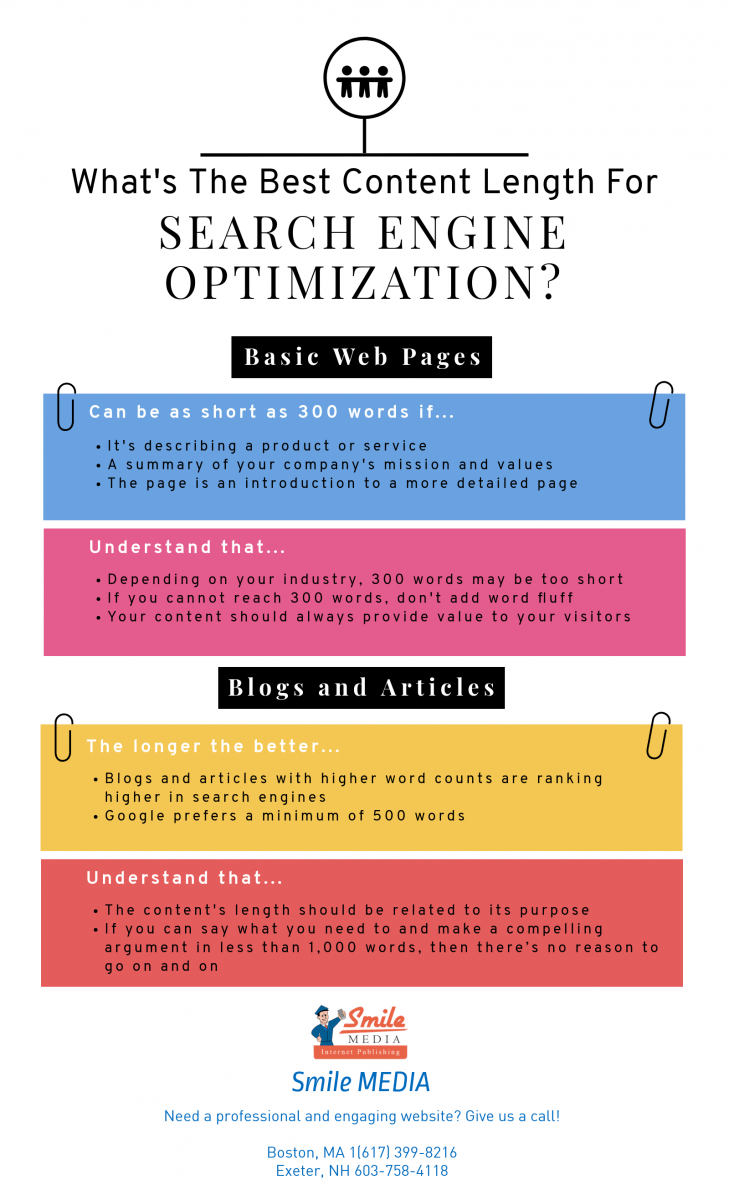Copywriters and marketers struggle with this very question on a regular basis. With Google and other search engines changing their algorithms faster than we can keep up, it can be hard to answer this question definitively on any given day. Today the answer might be much different than it was yesterday, and tomorrow it may be different from today.
While the length of your content does play an important role in optimizing for SEO, it is not the only factor, and it is certainly not the most important factor. That being said, we’ve gathered some advice from SEO professionals and put together a guide for recommended content length based on the type of content you’re creating, your audience, and your publishing platform.
According to many SEO professionals, a basic page on your website – one that generally describes the products and services that you offer, a summary of your company mission and values, or a page that introduces a more in-depth page – can be as short as 300 words.
However, it’s important to understand that, depending on the industry you’re writing about, and who you are writing to, 300 words may be much too short to get your point across. In some cases, however, it may be tough to get to 300 words, and it may be tempting to add a bunch of fluff.
We don’t recommend writing words just to meet minimum word requirements. Above all else, it’s crucial that the content you’re creating provides value to your visitors. You may want to consider hiring a copywriter to put your ideas into words to fill your pages.
2. Blogs and Articles
The word on the street right now appears to be that the longer your blog or article is, the better. This assumption is based on the fact that blogs and articles with higher word counts are ranking higher in search engines accordingly.
While the minimum blog word count that Google prefers hovers around is 500 words, that doesn't mean that you can’t write shorter articles and blogs. Before you begin, consider your topic what information would be most useful to your readers. Once you’ve done your research, you’ll have a better idea of how long your content is likely to be.
Again, the length of the content you’re writing should be directly related to its purpose, audience and how much there really is to say about the topic. If you can say what you need to and make a compelling argument in less than 1,000 words, then there’s no reason to go on and on. Then again, if you can write a 3,000-word blog where every word counts, then go for it.
However, it's important to keep the results of a recent Orbit Media study in mind, which found that "bloggers who spend longest on their blogs and write over 1,500 words per post are the most likely to experience a high level of success, yet only 1 in 20 bloggers write posts over 1,500 words as standard."
The Verdict
Longer is better. However, most writers and marketers choose to mix up their content lengths, depending on what they are trying to accomplish. If you need assistance creating a content marketing strategy for your business, SMILE media can help. We offer quality Boston web marketing services which include professional copywriting and content strategy development. Contact us today for a quote.











